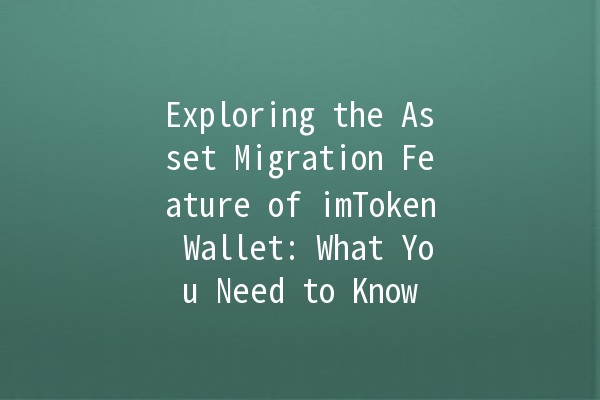As the cryptocurrency landscape evolves, the need for robust digital wallets becomes increasingly apparent. Among these wallets, imToken stands out for its diverse functionalities, particularly its asset migration feature. This article aims to elucidate the importance of the asset migration function, providing actionable insights and productivity tips for users looking to optimize their experience with imToken.
Asset migration in the imToken wallet allows users to transfer their digital assets seamlessly between different blockchain networks. This feature is vital for users who may wish to take advantage of varying transaction fees, speeds, or specific decentralized applications (dApps) that operate on different blockchains. The flexibility of migrating assets makes imToken a preferred choice for many crypto enthusiasts.

Overview: The imToken wallet includes a builtin swap function that simplifies the asset migration process. This feature allows users to exchange tokens directly within the app without external exchanges.
Application Example: If a user wishes to exchange Ethereum (ETH) for Binance Coin (BNB), they can do so by selecting the swap option, choosing the tokens, and completing the transaction in just a few taps.
Overview: Different blockchains have varying transaction fees. Users should stay informed of the fee structures associated with the blockchains they are utilizing.
Application Example: Before migrating assets, users can compare the transaction fees on Ethereum and Polygon. By doing this, they can decide to move their assets to Polygon for a significantly lower fee during peak network hours.
Overview: imToken supports multiple blockchains, allowing users to move assets across various networks easily. Utilizing these crosschain capabilities can optimize user experience.
Application Example: A user with USDT on Ethereum may find it beneficial to migrate their assets to the Tron network for faster transactions, especially if they frequently make transfers that require speed.
Overview: Different blockchains may have different token standards (e.g., ERC20 on Ethereum, BEP20 on Binance Smart Chain). Understanding these standards can help in ensuring compatibility during migration.
Application Example: Before migrating their assets, a user should verify that the receiving blockchain supports the token's standards to avoid potential loss of funds during migration.
Overview: Ensuring the security of assets during migration is paramount. Users should adhere to best practices related to wallet security and phishing prevention.
Application Example: Setting up twofactor authentication (2FA) on their imToken account can significantly enhance security. Additionally, users should be cautious of unsolicited messages or links that may lead to phishing sites.
The asset migration feature in imToken allows users to transfer their digital assets across various blockchain networks. This enables users to take advantage of different features, such as lower transaction fees or faster processing times on alternative networks.
To migrate your assets, open the imToken wallet, select the tokens you wish to move, choose the destination blockchain, and confirm the transaction. Ensure you have adequate fees in the originating blockchain to complete the migration.
Yes, several risks include transaction failures, network congestion, and compatibility issues between token standards. Users should conduct thorough research and ensure they are migrating to compatible networks to mitigate such risks.
No, each asset migration generally needs to be carried out individually to ensure that transferral goes smoothly and that all transaction requirements are met without errors.
Users can track their asset migrations through the imToken wallet’s transaction history feature. This section allows users to view all past transactions, including migrations and associated fees.
Most wallets, including imToken, do not impose a hard limit on the amount you can migrate; however, network fees and minimum transfer amounts dictated by the specific blockchain may affect how much you can move at any given time.
By understanding how to effectively utilize the asset migration feature in the imToken wallet, users can take full advantage of their cryptocurrency investments, streamline their transactions, and engage more fully with the growing world of digital assets.